Dr. Katherine Ramsland: The Forensic Resource You Need to See
Katherine Ramsland, Ph.D. has published 34 books and over 900 articles, and is the chair of Social Sciences at DeSales University, where she teaches about forensic psychology, profiling, serial murder, and forensic science. Her forthcoming book is The Devil’s Dozen: How Cutting-edge Forensics Took Down 12 Notorious Serial Killers.
The Forensic Resource You Need to See
Maybe you’re a crime writer seeking details about a case, or a judge who wants to see what happened in a prior Daubert decision. Maybe a cop learning to detect cybercrime in New Jersey, or an attorney who needs a refresher on entomology. Perhaps you’re just curious about virtual autopsies or a career in forensic science. No matter what angle interests you, there’s a Website on which you’ll probably find what you need.
When I became a member of the American Academy of Forensic Sciences, the world’s largest organization of forensic scientists, I heard about the impressive Professor Carol Henderson. In 2008, she was president of AAFS and her optimistic closing address to members directed us toward the future. Among many other things, she’s an authority on scientific evidence and law, and has presented workshops to thousands of forensic scientists, cops and attorneys worldwide. She’s also written four books and edits the Encyclopedia of Forensic and Legal Medicine.
I had the chance to speak with Professor Henderson recently and through her I learned about a surprisingly comprehensive and organized resource: the National Clearinghouse for Science, Technology, and the Law at Stetson University College of Law. Turns out, she’s the director and she has ambitions for this vast collection. All writers (and readers) interested in forensics and crime investigation should go right now to ncstl.org (or right after you finish reading this) and explore this impressive “one-stop-shop” database. It has over 72,000 records and continues to develop and consolidate information every day, offering books, articles, newspapers, webcasts, podcasts, vodcasts, blog links, and all kinds of training materials. There’s also a quarterly newsletter, with archives. The vision for this clearinghouse, which relies on a number of researchers, is to “foster communication between the scientific, technological and legal communities, resulting in awareness and understanding of the policies, interests and concerns affecting those communities.” Their mission is to promote justice and accuracy in all relevant areas.
Most of us in this field would agree: the sheer amount of information we have these days is difficult to process and organize, so a searchable database like this, with items from all over the world, is a godsend to many people in the legal community. According to the Website, among the resources the NCSTL provides are:
• a searchable database of legal, forensic, and technology resources
• a reference collection of law, science, and technology material
• partnerships with law schools, professional associations, and federal and state agencies
• national conferences on science, technology, and the law
• community acceptance panels
• training modules and primers with an emphasis on distance education
• training for defense counsel who are handling cases involving biological evidence on the applications and limitations of DNA evidence as stated in the President’s DNA Initiative.
• An inter-library loan service.
Those of us who have collected large libraries over the years will appreciate having so much of this information online and searchable. I encourage you to go look through the different areas of this Website. It’s free, and it’s incredibly helpful. Again, it’s http://ncstl.org.
Visit Dr. Katherine Ramsland at www.katherine Ramsland.com.





Thanks.